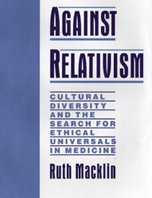Visiting David and Ahmed in Montreal in January, the issue came up of a rather disturbing quasi medical/religious practice, metzitzah b'peh, done commonly in New York as part of the tradition of some nutty religion. Ah but who am I to say--what right do I have to judge! (Check for yourself.)
Thus David who is an AIDS-and-human-rights consultant lent me this book. Though not a subject of interest to the general reader I suppose, Ruth Macklin's writing is unusually clear for an academic. Most anthropology and sociology writing is impenetrable, full of jargon and bloat.
 Macklin presents a variety of problems facing human rights workers worldwide. Generally they demonstrate the conflict between the wish to provide "universal" human rights to persons within cultures in which those rights conflict with traditional practice. A common argument against the application of a universal human right that conflicts with local tradition is that it is ethical imperialism--that you (ie the Westerner) have no right to impose your values on our culture--there is no "better" or "worse" set of values, only yours, and ours. You do not have the right to criticize the practices of a culture, from outside that culture. Thus do many customs considered abhorrent by the "west" find justification in this "relativist" rationale.
Macklin presents a variety of problems facing human rights workers worldwide. Generally they demonstrate the conflict between the wish to provide "universal" human rights to persons within cultures in which those rights conflict with traditional practice. A common argument against the application of a universal human right that conflicts with local tradition is that it is ethical imperialism--that you (ie the Westerner) have no right to impose your values on our culture--there is no "better" or "worse" set of values, only yours, and ours. You do not have the right to criticize the practices of a culture, from outside that culture. Thus do many customs considered abhorrent by the "west" find justification in this "relativist" rationale.You can go back and forth on this issue. On the one hand it is useful to be reminded that you are after all a product of your own culture and so cannot think much outside the limits of its assumptions. Much as we think we are independent thinkers, we are not "neutral". Mostly we are merely reflections of the common values of the society in which we happen to live. Just like everybody in other societies.
On the other hand if you refrain from criticizing the practices of other cultures because of this relativism, well there goes any notion of universal human rights. They keep slaves in Mauritania, to this day? Well that's their right. Families in China kill baby girls because boys are worth more? Well, who are we to judge!
So Macklin dives in, and tackles issues like female genital mutilation (keeps the women from being promiscuous!) , informed consent or not, for medical decisions, the definition of death, organ transplantation, the reproductive rights of women, and the rights of individual women vs the rights of their families. Macklin describes each case then picks her way through it, to arrive at a well-argued conclusion.
Now I have an idea what a "bioethicist" does. Since reading the book I have mentioned a couple of the dilemmas described, and am surprised to see how quickly people propose an answer to the thorniest of problems.
For example, anthropologists are trained to observe the culture they study, but not to interfere, so as to avoid potential damage to the culture and to their own research. Feminists have an obligation to help other women. What should a anthropologist who considers herself a feminist do when confronted with a situation in which a woman is being abused, and asks for help?
What can be considered "abuse" from outside the culture is considered normal behavior (eg, wife-beating is common Kenya), inside the culture. Is abuse a universal concept, or relative to the culture in which it occurs?
Asian regimes charge that western notions of human rights have no place in their countries because of the notion of "Asian values", in which the common good supposedly transcends individual rights. But Macklin says "...we should not fall prey to the threat posed by "Asian values" to the universality of human rights because the arguments in favor of that perspective are flawed and self-serving tools of leaders seeking to maintain their power by preserving the status quo."
A western-trained doctor who has an obligation to explain the risks of surgery so that a patient may make informed consent, confronts a Navajo who will simply reject the surgery if he hears about the risk, due to the Navajo cultural prohibition against talking about things "in a negative way". What should the doctor do?
A Laotian woman brings her baby to a western doctor, who notices burns on the baby's abdomen. It turns out the mother has burned the baby in an effort to cure a folk disease, by passing a burning reed dipped in hot fat over the skin. If the skin blisters then the baby will recover. If not the baby needs to be seen by a shaman who must perform a spiritual ceremony. In this case the burns numbered five, but as many as eleven burns may be needed. Is the mother abusing the baby? She means well. Who are we to judge?
The book is full of such puzzles.

1 comment:
wow, I have never seen a blog more uncouncious and unaware than yours. you are a sinner. Oh, and don’t try to be witty and leave a comment on my site. Just know that I have and will always win against your kind.
God 1
sinners 0
TCOJCOEMLDS
Post a Comment